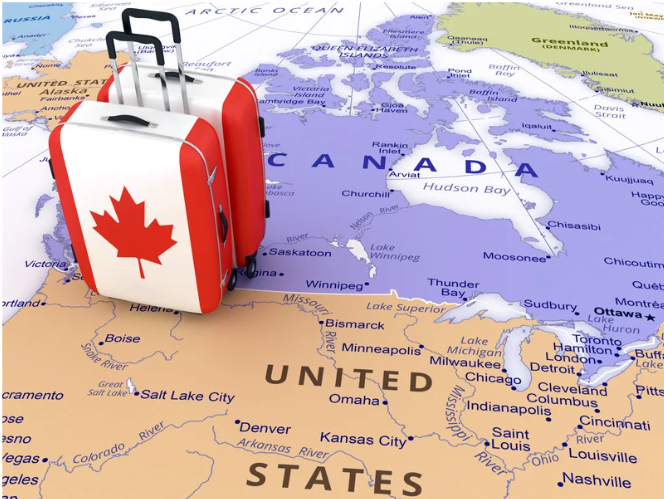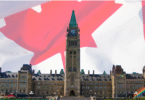Canada is dealing with big changes in its population. More people are getting older, and many industries need more workers. To keep the economy strong, Canada is focusing on bringing in skilled immigrants who can start working right away. These workers help fill job gaps, boost innovation, and improve productivity in important areas like healthcare, engineering, IT, construction, and finance.
To bring in skilled workers more effectively, the Government of Canada started the Express Entry system in 2015. Express Entry is an online system that handles permanent residency applications through three main economic immigration programs: the Federal Skilled Worker Program (FSWP), the Federal Skilled Trades Program (FSTP), and the Canadian Experience Class (CEC). It uses a points system called the Comprehensive Ranking System (CRS) to score and rank applicants. Points are given based on age, education, work experience, language skills, and how easily the person can settle in Canada.
This article is for skilled professionals who want to move to Canada and become permanent residents through the Express Entry program.
Understanding Express Entry
Express Entry is Canada’s main system for handling permanent residency applications from skilled foreign workers. Immigration, Refugees and Citizenship Canada (IRCC) launched it in 2015 to make the selection process faster and more efficient. It helps the government quickly find workers who meet current job market needs. Express Entry uses a points system called the Comprehensive Ranking System (CRS) to score applicants and invite those most likely to succeed in Canada’s economy.
The goal of Express Entry is to bring in skilled people who can help fill job gaps, grow the population, and support Canada’s long-term economic growth. It allows the government to assess applicants fairly and quickly, based on their skills and qualifications, not their country of origin or when they applied.
Immigration Programs Under Express Entry
Express Entry manages three federal economic immigration programs. Each targets a distinct group of skilled workers.
Federal Skilled Worker Program (FSWP)
This program is for skilled professionals with foreign work experience who intend to settle permanently in Canada. Eligibility criteria include:
- At least one year of continuous full-time (or equivalent part-time) skilled work experience in the past 10 years
- Minimum Canadian Language Benchmark (CLB) score of 7 in English or French
- Educational Credential Assessment (ECA) for foreign degrees
- Proof of settlement funds, unless already working in Canada
Federal Skilled Trades Program (FSTP)
This program targets individuals qualified in skilled trades. Eligibility criteria include:
- At least two years of full-time work experience in a skilled trade within the last five years
- A valid job offer or a certificate of qualification from a Canadian authority
- CLB 5 for speaking and listening, CLB 4 for reading and writing
- No formal education requirement, though education can improve the CRS score
Canadian Experience Class (CEC)
This program is for individuals who already have skilled work experience in Canada. Eligibility criteria include:
- At least one year of skilled work experience in Canada in the past three years
- Minimum CLB 7 for NOC TEER 0 or 1 jobs, or CLB 5 for TEER 2 or 3
- No proof of settlement funds required
- No minimum education requirement
Express Entry vs. Other Immigration Routes
Express Entry offers faster processing, streamlined assessment, and access to additional points through provincial nominations, making it one of the most efficient and competitive immigration pathways available to skilled workers.
| Feature | Express Entry | Other Immigration Routes |
| Processing Time | Around 6 months for most applications | May exceed 12 months or longer |
| Selection Method | Points-based, merit-driven | May be occupation- or region-specific |
| Eligibility Flexibility | Multiple pathways within a single system | Limited to program-specific criteria |
| Job Offer Requirement | Not mandatory (except for FSTP advantage) | Often required for employer-driven programs |
| Provincial Nominee Access | Integrated with Express Entry (enhanced PNP) | Separate streams for base PNP |
Step 1: Check Your Eligibility
Before you create an Express Entry profile, you need to check if you qualify for one of the three federal immigration programs: the Federal Skilled Worker Program (FSWP), the Federal Skilled Trades Program (FSTP), or the Canadian Experience Class (CEC). To be eligible, you must meet certain basic requirements, like your education level, work experience, language skills, and age. You must meet these requirements to enter the Express Entry pool.
Education
Your level of education directly affects your eligibility and CRS score.
- If you studied outside Canada, you must obtain an Educational Credential Assessment (ECA) from an approved agency to verify that your education is equivalent to a Canadian credential.
- Higher levels of education, such as a bachelor’s degree, master’s, or PhD, can significantly improve your ranking.
Work Experience
You must have recent, skilled work experience in a National Occupation Classification (NOC) TEER 0, 1, 2, or 3 job.
- For FSWP: At least one year of continuous full-time (or equivalent part-time) skilled work experience in the past 10 years is required.
- For FSTP: A minimum of two years of skilled trades experience within the last five years.
- For CEC: You must have at least one year of Canadian skilled work experience within the last three years.
Language Skills
Language proficiency is mandatory and must be proven with an approved test:
- IELTS or CELPIP for English
- TEF Canada or TCF Canada for French
- For FSWP: Minimum CLB 7 in all four areas (reading, writing, listening, speaking)
- For FSTP: Minimum CLB 5 for speaking and listening; CLB 4 for reading and writing
- For CEC: CLB requirement depends on the job’s TEER level (CLB 7 for TEER 0 or 1, CLB 5 for TEER 2 or 3)
Age
You must be at least 18 years old to apply through Express Entry.
- Applicants between 20 and 29 years receive the highest CRS points for age.
- Points gradually decrease as age increases beyond 30.
Step 2: Take an Approved Language Test
Language skills are a key requirement for Express Entry. They carry a lot of weight in the Comprehensive Ranking System (CRS) and can strongly affect your chances of qualifying and getting a high score. You must take an approved language test in English or French and reach the minimum score needed for the immigration program you are applying to.
You must take a test approved by Immigration, Refugees and Citizenship Canada (IRCC). Your results must be less than two years old at the time you submit your Express Entry profile.
For English:
- IELTS General Training (International English Language Testing System)
- CELPIP – General (Canadian English Language Proficiency Index Program)
For French:
- TEF Canada (Test d’évaluation de français)
- TCF Canada (Test de connaissance du français)
Required Minimum Scores
Your test results must meet the minimum Canadian Language Benchmark (CLB) levels for your selected immigration program:
| Program | Minimum CLB | IELTS Equivalent | CELPIP Equivalent |
| FSWP | CLB 7 | Listening: 6.0, Reading: 6.0, Writing: 6.0, Speaking: 6.0 | All scores at level 7 |
| FSTP | CLB 5 (speaking/listening), CLB 4 (reading/writing) | Speaking/Listening: 5.0, Reading: 3.5, Writing: 4.0 | Speaking/Listening: 5, Reading/Writing: 4 |
| CEC | TEER 0/1: CLB 7
TEER 2/3: CLB 5 |
Listening: 6.0, Reading: 6.0, Writing: 6.0, Speaking: 6.0 | Speaking/Listening: 5, Reading/Writing: 4 |
Step 3: Get Your Educational Credentials Assessed (ECA)
An Educational Credential Assessment (ECA) is an important requirement for most Express Entry applicants, especially if you’re applying through the Federal Skilled Worker Program (FSWP) or want CRS points for your education. The ECA shows that your degree, diploma, or certificate from another country is equal to a recognized Canadian qualification.
An ECA is an official report issued by a designated organization that evaluates the authenticity and equivalency of your foreign education.
It serves two main purposes:
- Eligibility: It proves that your education meets the minimum qualification requirements for the Express Entry program you are applying under.
- CRS Points: It allows you to claim additional points under the Comprehensive Ranking System, potentially improving your ranking in the Express Entry pool.
Approved ECA Organizations
IRCC designates specific organizations to conduct ECAs for immigration purposes. You must choose from the following approved bodies:
For General Assessments (FSWP, CEC, FSTP):
- World Education Services (WES)
- International Credential Assessment Service of Canada (ICAS)
- Comparative Education Service (CES) – University of Toronto
- International Qualifications Assessment Service (IQAS)
- International Credential Evaluation Service (ICES)
For Specialized Credentials (e.g., Physicians or Pharmacists):
- Medical Council of Canada (MCC) – for doctors
- Pharmacy Examining Board of Canada (PEBC) – for pharmacists
Step 4: Create Your Express Entry Profile
After you’ve confirmed your eligibility, taken your language test, and received your Educational Credential Assessment (ECA), the next step is to create your Express Entry profile. This profile is your official entry into the pool of candidates for permanent residency. It includes detailed personal and work-related information and gives you a Comprehensive Ranking System (CRS) score. Your CRS score decides your rank among other applicants.
What Information to Include
Your Express Entry profile must be accurate, complete, and consistent with the documents you’ll later submit. The key details you need to provide include:
Personal Information
- Full name, date of birth, nationality, marital status
- Passport or travel document details
Contact Information
- Residential address
- Email address (ensure it is active and checked regularly)
Language Test Results
- Test name (e.g., IELTS, CELPIP, TEF, TCF)
- Date of test and scores for each language skill
- Test report number
Educational Background
- All post-secondary education completed
- ECA report number and issuing organization (if applicable)
Work Experience
- Job titles, start/end dates, and primary duties
- National Occupational Classification (NOC) codes for each position
- Full-time or part-time status
Step 6: Receive an Invitation to Apply (ITA)
An Invitation to Apply (ITA) is an official invitation from Immigration, Refugees and Citizenship Canada (IRCC) asking you to submit a full application for permanent residency through Express Entry. Only the top-scoring candidates in the pool receive ITAs during regular draws. Getting an ITA is a big step—it means Canada sees your skills, education, and potential as valuable to the country’s economy.
An ITA is not a visa or a promise of permanent residence. It simply gives you the chance to move to the next step by submitting all the required documents for review. To get an ITA, you must have a valid Express Entry profile and meet the CRS score cut-off for that specific draw. After you receive an ITA, you have 60 calendar days to fill out and submit your application for permanent residence through your IRCC account.
Step 7: Submit Your Permanent Residency Application
After you receive an Invitation to Apply (ITA), the next step is to submit your Application for Permanent Residence (APR) through your IRCC online account. This stage is time-sensitive and requires many documents. You must submit your full application within 60 calendar days of getting your ITA. If you miss the deadline, your invitation will expire, and you will be removed from the Express Entry pool.
IRCC needs detailed documents to check your eligibility, background, and whether you can be admitted to Canada. All documents must be clear and accurate. If they are not in English or French, you must include certified translations.
Identification Documents
- Valid passport or travel document
- Digital photographs (passport-style, meeting IRCC specifications)
Language Proficiency
- Official results from your approved language test (e.g., IELTS, CELPIP, TEF, TCF)
Educational Credentials
- Educational Credential Assessment (ECA) report for foreign education
- Diplomas, degrees, and transcripts
Work Experience
- Reference letters from employers detailing job titles, duties, duration, hours, and salary
- Pay stubs or employment contracts (if required)
Police Certificates
- Police clearance from all countries where you have lived for 6 months or more since age 18
- Certificates must be recent and valid at the time of application
Medical Exam
- You must undergo a medical examination by a panel physician approved by IRCC
- Results are sent directly to IRCC; you’ll receive a document to upload as proof of completion
Proof of Funds
- Required for Federal Skilled Worker Program and Federal Skilled Trades Program (not needed for Canadian Experience Class)
- Bank statements, official letters from financial institutions showing account balances, and transaction history
- Funds must be readily available, unencumbered, and sufficient to support you and your family
Step 8: Wait for a Decision
After you submit your permanent residency application through Express Entry, you must wait for a final decision from Immigration, Refugees and Citizenship Canada (IRCC). During this time, IRCC will review your documents, run background checks, and complete medical and security screenings. This stage takes time, but staying alert and ready to respond to any requests will help keep the process on track.
IRCC aims to process most Express Entry applications within six months from the date they receive a complete application. However, the actual processing time can vary depending on:
- The complexity of your case
- Verification of documents
- Volume of applications at the time
- Your country of residence and travel history
You can view estimated processing times on the IRCC website. While most applications are handled within the target timeframe, some may take longer if extra checks or document clarifications are needed.
IRCC Communication and Updates
IRCC communicates primarily through your online account. You will receive messages and updates about:
- Acknowledgment of receipt (AOR)
- Biometric confirmation
- Medical exam status
- Background check progress
- Request for additional documents (if any)
- Final decision and portal instructions (if approved)
Frequently Asked Questions
How long does the Express Entry process take from start to finish?
The entire process—from checking eligibility to receiving permanent residency—can take approximately 8 to 12 months, depending on how quickly you complete each step and how long IRCC takes to process your application.
Can I apply to Express Entry without a job offer?
Yes. You do not need a job offer to create an Express Entry profile or receive an Invitation to Apply (ITA). However, a valid job offer can significantly increase your Comprehensive Ranking System (CRS) score.
Do I need to submit proof of funds?
Yes, unless you are applying under the Canadian Experience Class (CEC) or have a valid job offer and authorization to work in Canada.
Can I edit my Express Entry profile after submission?
Yes, you can update your profile as long as it has not received an ITA. After receiving an ITA, you must ensure all details in your application match the information in your profile. Discrepancies can lead to refusal.
Conclusion
Many applicants handle the process on their own, but some situations may require expert help. If you have issues like unusual documents, past refusals, or doubts about your eligibility, it’s a good idea to speak with a licensed immigration consultant or lawyer. They can help you understand the process and improve your chances of success.






